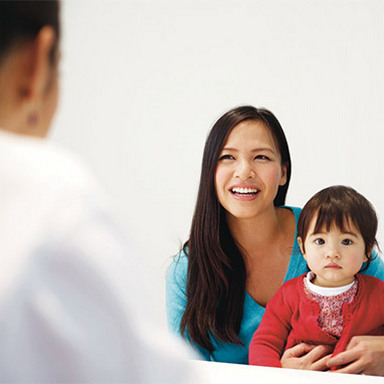Rotavirus is a common cause of vomiting and diarrhoea usually in babies and young children which can lead to severe dehydration, if not treated.
What is it?
Rotavirus is a virus that spreads very easily from person to person and is a common cause of severe diarrhoea and vomiting in babies and young children. Rotavirus disease is often more severe than other causes of diarrhoea because it is more likely to lead to dehydration (loss of body water), shock and sometimes death. Children can catch rotavirus several times in their lives. Generally, the first infection occurs between 3 and 36 months of age; and this first infection is usually the most severe.
What are the symptoms?
The symptoms of rotavirus can start suddenly, one to three days after infection, and can range from mild (lasting only a couple of days) to severe (life-threatening). Vomiting is usually the first sign, followed by diarrhoea. Other symptoms may include fever and drowsiness.
A rotavirus infection is more likely to lead to dehydration and hospitalisation of babies and young children than other causes of diarrhoea. Some signs of dehydration which may need medical attention include dry mouth, not urinating much, few or no tears when crying and sunken eyes.
Symptoms generally disappear after 3 to 7 days.
This is not a full list of symptoms that can occur following rotavirus infection. Please speak to a healthcare professional if you have any concerns about rotavirus.
How is it spread?
Rotavirus can spread easily among infants and young children especially those in childcare or kindergarten.
The virus can be found in high concentrations in the faeces (stools) of an infected child and is spread via the faecal-oral route (swallowing of or contact with infected faecal particles). Examples of when this may occur include when you change a nappy or care for a sick child, have close contact with an infected person, come in contact with clothing, bedding or other things that an infected person has used or eat food or drink water that is contaminated.
Those who recover from rotavirus can remain infectious for up to two months.
Rigorous and careful handwashing and disinfecting of baby change tables and toys is very important to help reduce the risk of spreading the disease.
Please speak to a healthcare professional if you are concerned about your baby’s risk of catching rotavirus.
Who is at risk?
Rotavirus can affect anyone, but babies and young children are most at risk of serious disease. Adults, especially those with a weakened immune system can also be infected with rotavirus.
Some groups of people are at increased risk of severe or life-threatening symptoms.
- Aboriginal and Torres Strait Islander children
- Those with a weakened immune system
- Those who have had an organ transplant
- Those with existing gastrointestinal problems.
Other people may also be at risk of rotavirus infection. Please speak to a healthcare professional about your individual circumstances.
Discover tips to help strengthen immune system function and keep you feeling your best as you age. Talk to your doctor about ways to maintain a healthy immune system and embrace healthy ageing
PM-AU-AVX-WCNT-190046 Date of GSK Approval: January 2021


